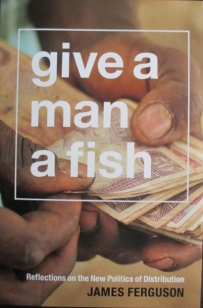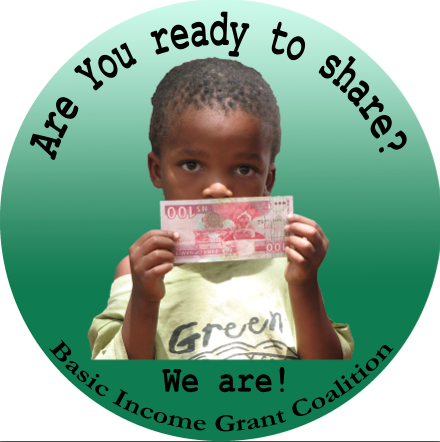This fascinat ing and ground-breaking book is, on the face of it, an enquiry into the new cash transfer programmes which are growing fast in Southern Africa. But in the end it’s much more: Ferguson looks deep into the politics of transfers and the way in which they may be linking to demands for a fair share in national wealth. The result is a radical – and practical – agenda for addressing the extreme poverty and inequality that persist in the world today.
ing and ground-breaking book is, on the face of it, an enquiry into the new cash transfer programmes which are growing fast in Southern Africa. But in the end it’s much more: Ferguson looks deep into the politics of transfers and the way in which they may be linking to demands for a fair share in national wealth. The result is a radical – and practical – agenda for addressing the extreme poverty and inequality that persist in the world today.
Anyone who has spent any time working in international development will have come across the old cliché: “Give a man a fish, and you feed him for a day. Teach a man to fish, and you feed him for a lifetime.” It sounds self-evidently true; it has the ring of old wisdom to it. But start to consider a bit more and problems emerge. One of my biggest issues with the phrase has always been that it suggests external ‘experts’ have a better idea about how to fish than poor people. As a number of failed agricultural development schemes have shown (see here and here for two classic Tanzanian examples), locals often know a lot more than outsiders about how to farm – or fish – in particular contexts. But Ferguson has an even more fundamental point. In an age of massive commercialisation and overproduction of fish, as well as widespread unemployment in fishing communities, should outsiders even be encouraging poor people to fish more anyway? Is the point not more about how to ensure the enormous amounts of fish – and other goods – produced in the world are distributed more fairly to the millions who are not getting their share?
Give a man a fish is about the new cash transfer programmes in Southern Africa, which have decided to ignore the cliché and “Just Give Money to the Poor” (as the title of another recent book has it). Following the successes of programmes in Mexico and Brazil, big schemes have now been established in South Africa and Namibia, leading to a situation where in South Africa, some 16 million individuals, or 30% of the population, are receiving some kind of state-funded transfer. At a time when so many commentators are proclaiming the triumph of free market capitalism it’s astonishing that something close to a welfare state is in the process of being built in several developing countries. But Ferguson – an anthropologist and something of a hero of mine as the author of a classic critique of development, The Anti-Politics Machine (1990) – is not only trying to explain the rise of cash transfer programmes or look at whether they work on their own terms (by the way, the consensus is that they do). He is most interested in the political implications of transfers, and how these may open up a new way to challenge contemporary capitalism.
At the moment, cash transfers in Southern Africa (as well as in most other countries) have mainly consisted of old age pensions, child support grants and disability grants. The transfers have not yet touched the archetypal “able-bodied working man”, who is expected to support his family through wage labour. But in South Africa in particular, unemployment is currently at incredibly high levels (officially 25%, unofficially much higher, and youth unemployment at 66%). Whereas in previous eras much of the population might be regarded as exploited by the capitalist system, especially in the mining industry, nowadays huge numbers of people are simply marginal, not even worth the trouble of exploiting. In this context, there are some in South Africa who are controversially arguing that it’s not possible for the country to find jobs for everyone, and that the system of cash transfers should be extended to the one category currently excluded: young men.
There have been campaigns both in South Africa and Namibia for a so-called Basic Income Grant (BIG) – a small financial transfer, initially proposed at around $16 per month in South Africa, for every man, woman and child in the country. (The rich would of course give back their $16 and more through the tax system.) These campaigns have not yet got very far politically, but Ferguson sees in them the possible seed of a new politics. His idea is that as transfers come to encompass all disadvantaged citizens, attitudes towards them may change so they are less seen as ‘charity’ or ‘handouts’ and more as citizens’ ‘rightful share’ in the nation’s wealth. This is potentially quite a far-reaching idea, and it’s really possible to imagine it becoming a political rallying cry for change in several developing countries.

With any kind of social payment, there will always be concerns about dependence. Ferguson deals with these concerns effectively by arguing that the poor are already dependent (even those with casual jobs are dependent on their employers) – so it is a question of which kind of dependence is preferable. Research into the effects of cash transfers has found that payments tend to increase recipients’ participation in social and economic activities, from petty trade to searching for work, rather than to discourage them from looking for other sources of income. There is also a very interesting discussion on the reasons why many people in Southern Africa actively seek dependence on a patron. Ferguson again links it to the increasing marginalization of the poor – in his words, the poor “have become not worth subjecting […] For those thus abjected, subjection can appear only as a step up.”
The book is written mainly for an academic audience and it’s quite jargon-heavy in parts. But the ideas are fresh and there are also some lively stories to keep the reader interested. One of my favourites describes an NGO-led workshop on housing rights in Cape Town. Slum dwellers were shown one PowerPoint presentation after another on the constitutional right to housing, the history of housing rights in South Africa, etc. Towards the end of the day a tired-looking old man at the back of the room stood up and said quietly:
“I’m afraid there has been some mistake here. All I have heard about today is that I have the right to a house […] But the problem is I don’t want the right to a house […] I want a house.”
This for me neatly expresses one of the book’s central points: that all the effort to improve systems in development, on democratic processes and legal rights and so on, has so far struggled to make a serious impact on the extreme economic inequalities found in many poor countries. Perhaps it is now time to start addressing those inequalities head on.
Great review thanks/Kalle
LikeLiked by 1 person